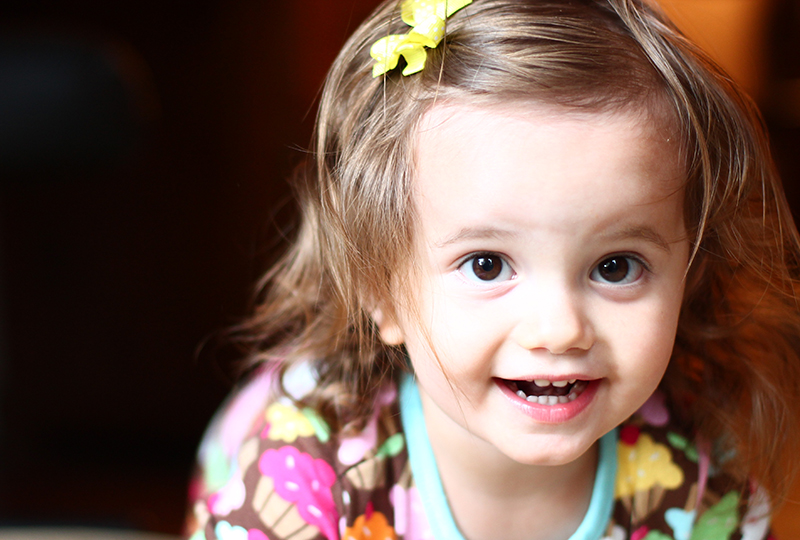A parent shares her wisdom after navigating the challenges of having a child who bit.
You would never guess it, but this is the face of a former biter.
Her nickname: Piranha.
Her bite: Quick, sharp and determined.
Yes, something that parents dread had happened to us. Our daughter was the classroom biter at day care, a problem that can cause real health concerns. Her biting was frequent, though rarely mean-spirited. Some weeks, it would be so bad that that when I would pick her up from day care my first question would be, “Did she bite today?”
My husband and I started paying close attention to when she bit and tried to make sense of why she was biting so that we could try to avoid it. Her biting cycle was on and off for more than 12 months, so we learned a lot during that time. Now, when other parents ask for my advice when their child bites, I encourage them to think about the following questions:
- Is something else going on that is making your child want to bite? Piranha typically bit when she was cutting a tooth. As soon as the tooth was through, she ceased biting.
- When is your child biting? We noticed that Piranha was more likely to bite when she was tired or hungry, so we tried to stay ahead of schedule with snacks, meals and naps. She would also bite when she didn’t get her way or another child had something she wanted.
- Who is your child biting? While Piranha didn’t exclusively bite one person, she did bite me and her brother most frequently. Our pediatrician said this was probably because she was most comfortable with us.
If your child is a biter, do your best to keep a close eye on her to help prevent a bite before it happens. We had many close calls with Piranha and her brother where we would literally lift her away as she was bending to bite his arm or leg. At day care, the teachers always were sure to be extra close to her, especially during those teething/increased biting periods.
If your child is in day care, communication with her teachers is so important. Be sure to ask if she bit or tried to bite any friends during the day, what discipline was involved, and for other details. It is very important to be consistent at home and at day care. We would also talk to Piranha before school, reminding her to be gentle with her friends and not to bite.
What to do when your child bites
Biting happens. Instead of yelling or making a big deal out of it, which will just give a toddler the attention she desires, try these responses:
- Remove your child from the situation.
- Explain that teeth aren’t for biting people, they are for biting food. (We love the books “No Biting” and “Teeth are Not for Biting“). Also talk about how biting hurts our friends, and we should never bite. Even at a very young age, a child can comprehend this simple messaging.
- Encourage your child that if her teeth are hurting, to ask for a teether. Piranha would say, “ice, ice” when her teeth were bothering her.
- Have your child say they are sorry, hug who they bit and help them hold ice on the bite (if necessary).
Also, I can’t stress enough the importance of talking with your pediatrician, who will also be able to provide counsel and wisdom.
Some people will tell you, just bite ’em back! However, most research and experts would suggest that children should not be bitten back. Rather, a parent should illustrate that they bite causes pain and continue to reinforce that message. Moreover, toddlers take cues from their environment. So if an adult bites them, that only illustrates that this is an acceptable behavior.
Having a child who bites is challenging, but they do grow out of it. By the time our daughter turned 2, she rarely bit anymore. Be patient with yourself and your child. It does get easier.
Jessica Turner is part of Vanderbilt’s social media team. She loves spending time with her family, memory keeping and blogging on her popular lifestyle blog, The Mom Creative.

